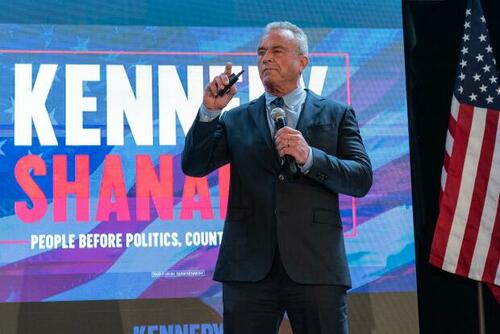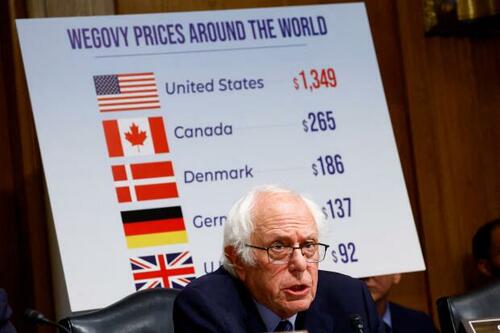
Senators To Propose Ban On Big Pharma Ads As TV Networks Stand To Get Wrecked
Senators Bernie Sanders of Vermont and Angus King of Maine, both independents, on Thursday will introduce legislation that would ban pharmaceutical companies from promoting prescription drugs directly to consumers – including through television, radio, print, digital platforms, and social media, the WSJ reports.
 HHS Secretary Robert F. Kennedy Jr. said when running for president he planned to ban pharmaceutical ads from TV. Photo: Lev Radin/Zuma Press
HHS Secretary Robert F. Kennedy Jr. said when running for president he planned to ban pharmaceutical ads from TV. Photo: Lev Radin/Zuma PressThe proposal would mark a sweeping shift in the U.S. advertising landscape, where pharmaceutical companies are among the largest spenders. Prescription drug brands accounted for roughly 13 percent of all ad spending on linear television in 2025, totaling approximately $2.18 billion so far this year, according to iSpot data. In 2024, the industry spent $3.4 billion on traditional TV ads between January and August alone, according to ad-tracking data.
“The American people don’t want to see misleading and deceptive prescription drug ads on television,” Sanders said in a statement. “They want us to take on the greed of the pharmaceutical industry and ban these bogus ads.”
The legislation follows longstanding criticism from Health and Human Services Secretary Robert F. Kennedy Jr., who has repeatedly called for a ban on prescription drug advertising. While running for president, Mr. Kennedy said he would issue an executive order removing pharmaceutical ads from television, citing overmedication and industry influence on news coverage.
 ‘The American people don’t want to see misleading and deceptive prescription drug ads on television,’ Sen. Bernie Sanders said in a statement. Photo: piroschka van de wouw/Reuters
‘The American people don’t want to see misleading and deceptive prescription drug ads on television,’ Sen. Bernie Sanders said in a statement. Photo: piroschka van de wouw/Reuters“We’re one of only two countries in the world that allow pharmaceutical companies to advertise directly to consumers,” Mr. Kennedy said in a video posted to X. “Everybody agrees it’s a bad idea.”
The United States and New Zealand are currently the only countries that permit direct-to-consumer (DTC) prescription drug ads.
Mr. Sanders and Mr. King, who each voted against Mr. Kennedy’s confirmation, have long expressed skepticism of consumer drug marketing. In February, Mr. King introduced a bill that would prohibit pharmaceutical advertising in the first three years following a drug’s approval.
Other lawmakers from both parties have taken similar steps. In May, Senators Josh Hawley, Republican of Missouri, and Jeanne Shaheen, Democrat of New Hampshire, introduced legislation to eliminate tax deductions for pharmaceutical consumer advertising.
Since 1997, when the Food and Drug Administration relaxed disclosure requirements for DTC ads, pharmaceutical companies have increasingly leaned on consumer advertising to drive demand. Under current rules, companies need only disclose a drug’s “most important” risks during commercials.
The result has been a media environment saturated with pharmaceutical messaging. Drug ads made up 24.4 percent of all advertising minutes on evening news broadcasts across major networks — including ABC, CBS, CNN, Fox News, MSNBC, and NBC — through May of this year, according iSpot. On CBS Evening News, pharmaceutical companies appeared in more than 70 percent of commercial breaks, per Kantar Media.
Huge
*SENATORS TO PROPOSE BAN ON DRUG ADVERTISING TO CONSUMERS: WSJ
This would destroy most of legacy media overnight https://t.co/FydjBGzNlx
— zerohedge (@zerohedge) June 12, 2025
The industry has defended the practice. The Pharmaceutical Research and Manufacturers of America, a leading trade group, points to its “guiding principles,” arguing that direct‑to‑consumer ads increase disease awareness, encourage patients to seek treatment, and prompt conversations with doctors.
Any move to ban pharmaceutical advertising could face legal challenges under the First Amendment’s protections for commercial speech.
Still, Mr. Sanders and Mr. King maintain their efforts are necessary to push back against what they describe as an overcommercialized influence on public health messaging.
Tyler Durden
Thu, 06/12/2025 – 14:30










![Zasiłek pielęgnacyjny z MOPS, dodatek z ZUS i termin na wniosek [Wyrok NSA]](https://g.infor.pl/p/_files/38511000/niepelnosprawnosc-orzeczenie-prawo-38510504.jpg)



![Emeryt i ZUS: W pierwszym przypadku emerytura zaniżona o 637,29 zł, a drugim o 876,54 zł [List czytelnika]](https://g.infor.pl/p/_files/38424000/podwyzki-38424281.jpg)
